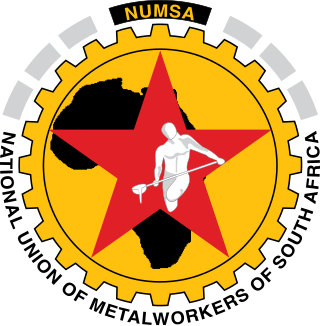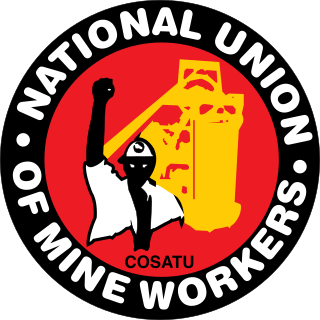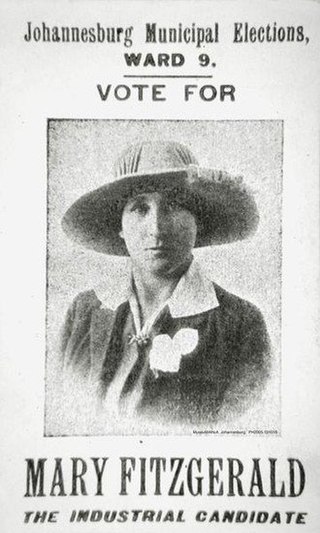Federation of South African Trade Unions | |
 | |
| Merged into | COSATU |
|---|---|
| Founded | 20 April 1979 |
| Dissolved | 1 December 1985 |
| Location | |
The Federation of South African Trade Unions (FOSATU) was a trade union federation in South Africa.
Federation of South African Trade Unions | |
 | |
| Merged into | COSATU |
|---|---|
| Founded | 20 April 1979 |
| Dissolved | 1 December 1985 |
| Location | |
The Federation of South African Trade Unions (FOSATU) was a trade union federation in South Africa.
The federation was formed at a congress over the weekend of 14–15 April 1979 in Hammanskraal and officially launched five days later on 20 April. [1] [2] Its roots lay in the unions which had emerged from the spontaneous 1973 strike wave by black workers in Durban and Pinetown as part of the "Durban Moment", [3] and which had since been part of the Trade Union Advisory Co-ordinating Council or the Black Consultative Committee. [4]
FOSATU's constitution enshrined the principles of workers' control of their trade unions, non-racialism, worker independence from party politics, international worker solidarity and trade union unity. It strove to build a tight national federation to work towards an industrial workers' bloc firmly based in strong grassroots organisation on the factory floor. [5] It became the first truly national non-racial trade union federation in South African history, building unity and avoiding the regionalism which had pervaded earlier attempts at such an organisation. Its success here has been attributed to the fostering of a national leadership layer of "organic intellectuals" through a strong focus on the political education of shop stewards, and tight integration of the national, provincial and local structures of the organisation. [6]
While the unions affiliated primarily organised black workers, their leadership, and that of FOSATU, was mixed, and included white activists in some prominent positions. As the Government of South Africa legalised multi-racial unions in 1979, FOSATU's affiliates decided to register. However, despite applying for multi-racial status, the government issued six of the unions with certificates which only permitted the organisation of black workers. FOSATU successfully challenged this, and the number of non-black members gradually increased. [7]
FOSATU argued for its affiliates to become industrial unions, merging so that there was only one representing workers in each industry. This led to a number of mergers, most significantly in 1980 when several unions formed the new National Automobile and Allied Workers' Union. By 1983, the federation represented workers at 489 factories, and had a total of 285 agreements with employers. [7]
The federation initially opposed industrial councils, arguing that they moved unions away from plant-based negotiations, and often compelled affiliates to renounce the right to strike. From 1982, it permitted affiliates to join industrial councils, although in some cases they faced strong opposition from rival unions. The right to strike was important, and for example, in 1983, its affiliates took part in 124 work stoppages, more than one-third of the total number of strikes across the country. It also organised consumer boycotts where a major employer would not negotiate, such as at Colgate-Palmolive in 1981. [7]
As part of its commitment to trade union unity, FOSATU was prepared to disband its structures if wider unity could be attained. [3] On 1 December 1985, following four years of unity talks between competing trade union federations, FOSATU upheld this pledge by dissolving into the newly formed Congress of South African Trade Unions (COSATU). [8] [9]
| Union [10] | Abbreviation | Founded | Left | Reason for leaving | Membership (1980) [11] | Membership (1983) [12] |
|---|---|---|---|---|---|---|
| Chemical Workers' Industrial Union | CWIU | 1974 | 1985 | Transferred to COSATU | 3,000 | 6,260 |
| Eastern Province Sweet, Food and Allied Workers' Union | EPSFAWU | 1977 | 1982 | Merged into SFAWU | 200 | N/A |
| Engineering and Allied Workers' Union | EAWUSA | 1963 | 1982 | Expelled | 3,000 | N/A |
| Glass and Allied Workers' Union | GAWU | 1973 | 1983 | Merged into CWIU | 1,300 | N/A |
| Jewellers' and Goldsmiths' Union | JGU | 1939 | 1985 | Became independent | 460 | 476 |
| Metal and Allied Workers' Union | MAWU | 1973 | 1985 | Transferred to COSATU | 8,400 | 20,050 |
| Natal Sugar Industry Employees' Union | NSIEU | 1937 | 1984 | Expelled | N/A | 1,000 |
| National Automobile and Allied Workers' Union | NAAWU | 1980 | 1985 | Transferred to COSATU | N/A | 18,390 |
| National Union of Motor Assembly and Rubber Workers of South Africa | NUMARWOSA | 1967 | 1980 | Merged into NAAWU | 4,500 | N/A |
| National Union of Textile Workers | NUTW | 1973 | 1985 | Transferred to COSATU | 8,300 | 13,150 |
| Paper, Wood and Allied Workers' Union | PWAWU | 1974 | 1985 | Transferred to COSATU | 3,000 | 5,030 |
| Sweet, Food and Allied Workers' Union | SFAWU | 1974 | 1985 | Transferred to COSATU | 2,000 | 10,150 |
| Transport and General Workers' Union | TGWU | 1973 | 1985 | Transferred to COSATU | 4,500 | 6,335 |
| United Union of Automobile, Rubber and Allied Workers of South Africa | UAW | 1973 | 1980 | Merged into NAAWU | 4,000 | N/A |
| Western Province Motor Assembly Workers' Union | WPMAWU | 1963 | 1980 | Merged into NAAWU | 1,250 | N/A |

The Congress of South African Trade Unions is a trade union federation in South Africa. It was founded in 1985 and is the largest of the country's three main trade union federations, with 21 affiliated trade unions.

The National Union of Metalworkers of South Africa (NUMSA) is the biggest single trade union in South Africa with more than 338,000 members, and prior to its expulsion on 8 November 2014, the largest affiliate of the Congress of South African Trade Unions (COSATU), the country's largest trade union federation.

The National Union of Mineworkers (NUM) is a mainly mining industry related trade union, an organisation of workers with common goals through organised labour, in South Africa. With a membership of 300,000 as of 2014, it is the largest affiliate of the Congress of South African Trade Unions (COSATU).
Trade unions in South Africa has a history dating back to the 1880s. From the beginning unions could be viewed as a reflection of the racial disunity of the country, with the earliest unions being predominantly for white workers. Through the turbulent years of 1948–1991 trade unions played an important part in developing political and economic resistance, and eventually were one of the driving forces in realising the transition to an inclusive democratic government.
The National Union of South African Students (NUSAS) was an important force for liberalism and later radicalism in South African student anti-apartheid politics. Its mottos included non-racialism and non-sexism.

The Rand Rebellion was an armed uprising of white miners in the Witwatersrand region of South Africa, in March 1922. Jimmy Green, a prominent politician in the Labour Party, was one of the leaders of the strike.

Internal resistance to apartheid in South Africa originated from several independent sectors of South African society and took forms ranging from social movements and passive resistance to guerrilla warfare. Mass action against the ruling National Party (NP) government, coupled with South Africa's growing international isolation and economic sanctions, were instrumental in leading to negotiations to end apartheid, which began formally in 1990 and ended with South Africa's first multiracial elections under a universal franchise in 1994.

Mary Fitzgerald was an Irish-born South African political activist and was considered to have been the first female trade unionist in the country. She was South Africa's first female master printer. As editor of the Voice of Labour, she published articles advocating for women's enfranchisement, racially integrated trade unions and revolutionary socialism. She played a lead role in the Black Friday Riots of 1913. She was the first woman to be elected to the Johannesburg City Council (JCC) in 1915 and later served as Deputy Mayor of Johannesburg.

The Workers and Socialist Party (WASP) is a Marxist and Trotskyist political party in South Africa affiliated to International Socialist Alternative.
The South African Railways and Harbours Union was formed by black workers of the South African Railways and Harbours Administration after they had been expelled from the National Union of Railway and Harbour Servants.
The South African Congress of Trade Unions (SACTU) was a national trade union federation in South Africa.

Edwin Thabo Mofutsanyana was born in the Witsieshoek area in the Free State. He was a teacher, miner and journalist. Mofutsanyana became an active member of the Communist Party of South Africa and the African National Congress. He studied in the Lenin School in Moscow in the 1930s where he strengthened his political knowledge. A district municipality in the eastern Free State of South Africa is named in his honour.
Phumzile John Gomomo was a South African unionist and activist.
The Trade Union Council of South Africa (TUCSA) was a national trade union federation in South Africa.
The Council of Unions of South Africa (CUSA) was a national trade union federation in South Africa.
The Hotel and Restaurant Workers' Union (HARWU) was a trade union representing hospitality workers in South Africa.
The Urban Training Project (UTP) was an initiative to encourage black workers in South Africa to form new trade unions.
The Trade Union Advisory Co-ordinating Council (TUACC) was a national trade union federation in South Africa.
Christopher Ndodebandla Dlamini was a South African trade union leader.
The Building, Construction and Allied Workers' Union (BCAWU) is a trade union representing workers in the construction industry in South Africa.